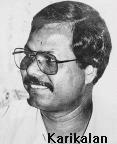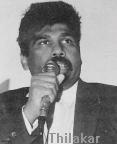


The LTTE wants to secure and maintain the good offices of a western country as a third party facilitating any process connected to a future dialogue with the government of Sri Lanka. This has been the LTTE’s goal from the day it became clear that India is ultimately interested in undermining the Tamil cause - and more so after it burntits boats with Delhi by fighting the Indian armyand later by exterminating Rajiv Gandhi.


The Tigers fi nally admitted that Thilakar had indeed been to the Vanni and that Karikalan the deputy chief of their political wing is in a western country. An authoritative LTTE source said last week that Thilakar’s visit to the Vanni from Europe was in connection with a process initiated by a western government which is keen to solve the conflict in Sri Lanka.
However, he insisted that his organization has had no direct contact with the Sri Lankan government thus far and that it will persist on the army’s withdrawal to pre-Riviresa I positions as a non negotiable precondition for beginning peace talks with the PA. And he denied reports that Dr. Balasingham had also left the Vanni with Karikalan to England.
Dr. Balasingham is still working with the Tigers in the northern jungles he said. Karikalan, according to him is now in the western country which is currently involved in matters connected to Thilakar’s sojourn in the Vanni. It is apparent that the Tigers will not officially acknowledge any of this right now, obviously in view of the sensitivities of the western government that has facilitated the process.
As we pointed out in these columns earlier, the deputy chief of the LTTE’s political wing could not have gone abroad without a country granting him the necessary papers to stay on its soil and also that such papers could not have been given without some tacit acknowledgment of the Sri Lankan government.
All western governments have very cordial relations with the PA regime and as such it is very unlikely that one of them would have invited a high profile LTTE leader without informing at least a section of the PA leadership.
But the LTTE was not inclined to comment on this matter. It only reiterated that it would stand by the conditions for peace talks that Prabhaharan had outlined in his Great Heroes’ Day speech. Meanwhile in the Vanni, the Tigers have said in several public meetings that if they have to enter into a dialogue with the Sri Lankan government they will not compromise on the principles of self determination and the traditional Tamil homeland. Three things are obvious in all this.
a) the LTTE wants to secure and maintain the good offices of a western country as a third party facilitating any process connected to a future dialogue with the government of Sri Lanka.
This has been the LTTE’s goal from the day it became clear that India is ultimately interested in undermining the Tamil cause - and more so after it burnt its boats with Delhi by fighting the Indian army and later by terminating Rajiv Gandhi. The west, in the LTTE’s view, had to become the countervailing factor in the geopolitical equations of Sri Lanka’s ethnic conflict. The Tigers have tried hard for the last seven years to cultivate the west. They have had more setbacks than success.
The Swiss and the Canadians turned hostile. The Americans kept calling them terrorists until recently, even threatening to bring them under the purview of a law intended to give wide powers to the federal government for monitoring and combating terrorism globally. But the LTTE was determined to somehow secure at least the nominal commitment of a western country as a third party.
b) as we pointed out in these columns last month, the LTTE’s priority now is military. This is why it is insisting on the withdrawal of the army to pre - Riviresa I positions as a precondition for talks. The Tigers appear to be quite confident of tilting the overall strategic balance of the Eelam War in their favour this year despite the government’s plan to open the land route to Jaffna through the western part of the Vanni. Their efforts are all currently aimed at this. More than a thousand Tiger cadres have been moved from the Batticaloa and Ampara districts to the Vanni.
It appears that two shipments have been unloaded recently and some of the weapons have already been issued to units in some parts in the northeast. (one will find the serial numbers on such weapons erased as a strict rule, apparently to prevent the detection of the source of supply. This is not done to weapons captured from the army.
The LTTE did not comment on a report in the Tamil weekly ‘Thinamurasu’ that thousands of artillery shells are being transported to certain positions in the Vanni.) In this context we can say that the war will intensify without basically jeopardizing the LTTE’s position vis-a-vis the western government which facilitated Thilakar’s visit.
c) further strengthen the organization’s political standing in the east by Karikalan’s future role in any dialogue or his function in the west. He is the most prominent political leader which the LTTE currently has from the east.
Although the Tigers strongly deny that they have such motives, the side benefit from having a person from the east in this role is tremendous. (The PLOTE’s standing in the east went up in 1985 when it sent Vasudeva to the Thimpu talks. He was the only from the east to take part in that dialogue) The outcome of the Thilakar - Karikalan episode will ultimately depend on how the Eelam war will develop in the coming months.
Go to Rajpal Abeynayake's Column
Return to the Editorial/Opinion contents page
